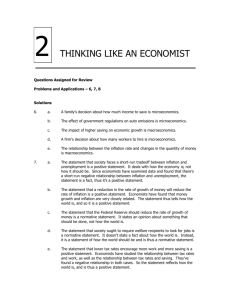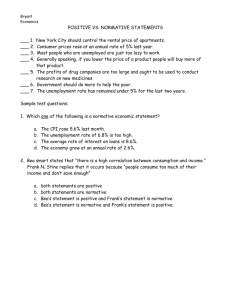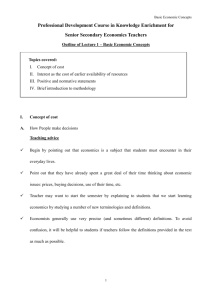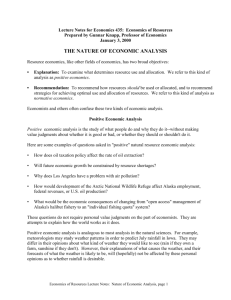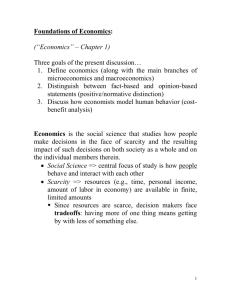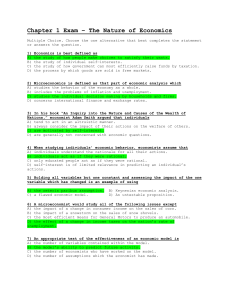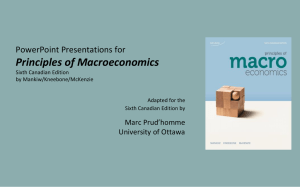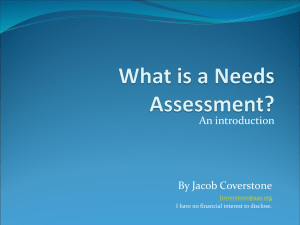Positive vs. Normative Analysis in Economics
advertisement
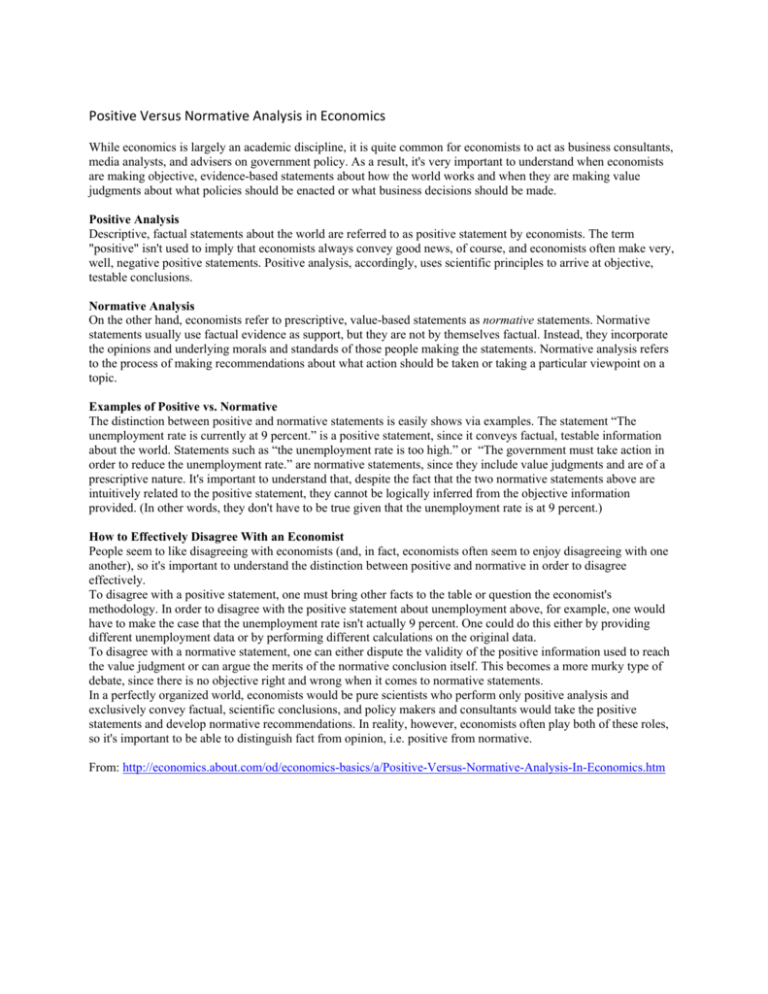
Positive Versus Normative Analysis in Economics While economics is largely an academic discipline, it is quite common for economists to act as business consultants, media analysts, and advisers on government policy. As a result, it's very important to understand when economists are making objective, evidence-based statements about how the world works and when they are making value judgments about what policies should be enacted or what business decisions should be made. Positive Analysis Descriptive, factual statements about the world are referred to as positive statement by economists. The term "positive" isn't used to imply that economists always convey good news, of course, and economists often make very, well, negative positive statements. Positive analysis, accordingly, uses scientific principles to arrive at objective, testable conclusions. Normative Analysis On the other hand, economists refer to prescriptive, value-based statements as normative statements. Normative statements usually use factual evidence as support, but they are not by themselves factual. Instead, they incorporate the opinions and underlying morals and standards of those people making the statements. Normative analysis refers to the process of making recommendations about what action should be taken or taking a particular viewpoint on a topic. Examples of Positive vs. Normative The distinction between positive and normative statements is easily shows via examples. The statement “The unemployment rate is currently at 9 percent.” is a positive statement, since it conveys factual, testable information about the world. Statements such as “the unemployment rate is too high.” or “The government must take action in order to reduce the unemployment rate.” are normative statements, since they include value judgments and are of a prescriptive nature. It's important to understand that, despite the fact that the two normative statements above are intuitively related to the positive statement, they cannot be logically inferred from the objective information provided. (In other words, they don't have to be true given that the unemployment rate is at 9 percent.) How to Effectively Disagree With an Economist People seem to like disagreeing with economists (and, in fact, economists often seem to enjoy disagreeing with one another), so it's important to understand the distinction between positive and normative in order to disagree effectively. To disagree with a positive statement, one must bring other facts to the table or question the economist's methodology. In order to disagree with the positive statement about unemployment above, for example, one would have to make the case that the unemployment rate isn't actually 9 percent. One could do this either by providing different unemployment data or by performing different calculations on the original data. To disagree with a normative statement, one can either dispute the validity of the positive information used to reach the value judgment or can argue the merits of the normative conclusion itself. This becomes a more murky type of debate, since there is no objective right and wrong when it comes to normative statements. In a perfectly organized world, economists would be pure scientists who perform only positive analysis and exclusively convey factual, scientific conclusions, and policy makers and consultants would take the positive statements and develop normative recommendations. In reality, however, economists often play both of these roles, so it's important to be able to distinguish fact from opinion, i.e. positive from normative. From: http://economics.about.com/od/economics-basics/a/Positive-Versus-Normative-Analysis-In-Economics.htm The Need for Normative Statements in Positive Economics Positive economists hope to analyze economics on a purely scientific basis, focusing only on issues that can be settled by observation and evidence. The problem with the positive economics approach is that important issues exist that are not simply a matter of evidence, such as the debate about categorizing economics as a science. The need for interpretation creates space for opinions and values, which are normative actions. The Need for Positive Economics in Normative Policies Normative economists could make a judgment about which economic goals are desirable, and positive economists could decide how to attain those goals. For example, if the goal is to minimize unemployment, positive economists could review current unemployment rates and predict how certain economic factors could influence employment figures. Read more : http://www.ehow.com/info_7755655_normative-vs-positive-economics.html Question in Economics Discuss whether each statement is purely positive statement or also contains normative element and or value judgement a)an increase in the personal income tax slow the growth rate of the economy. b)the goal of any country's economic policy should be to increase the well-being of its poorest vulnerable citizens. c)the best way to reduce the national poverty rate is to increase the federal minimum wage. d)the 1990 s were a disastrous decade for the us economy income inequality increased to its highest level since before war II. e)The unemployment rate is high mainly because companies are hiring immigrants to fill positions that would have been offered to natives. Companies should hire more native workers. f) Because of the high unemployment rate, the government should restrict the number of immigrants entering the country. This way, companies are forced to hire native workers to fill vacant positions. g) The government should increase cigarette taxes. That is the only way to discourage cigarette smokers. h) Research has shown that a cigarette tax of 4% decreased demand for cigarettes by 8%, while a tax of 6% decreased demand by 12%. Raising the cigarette tax decreases the quantity demanded for cigarettes.
